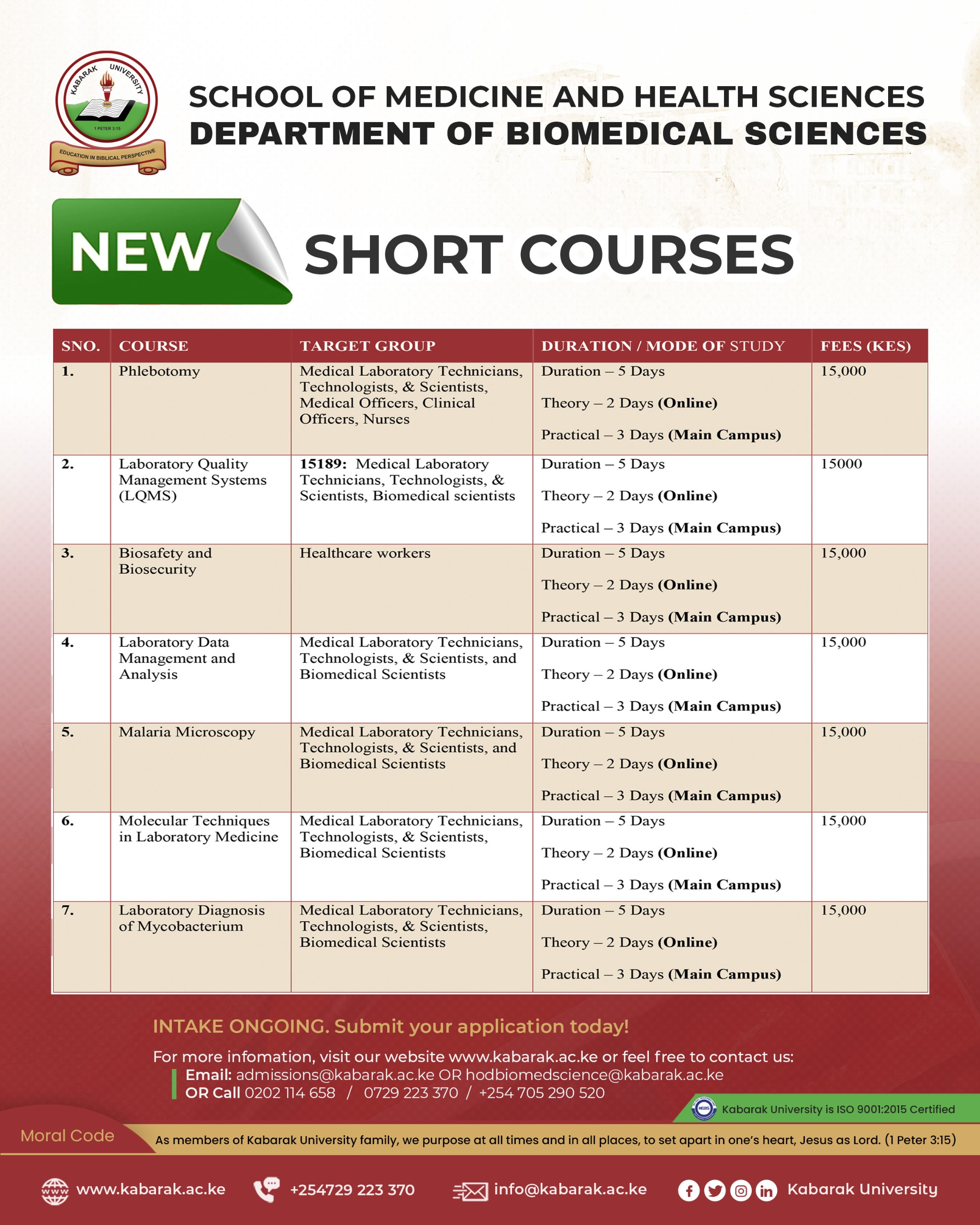Department of Biomedical Sciences
Welcome to the Department of Biomedical Sciences at Kabarak University's School of Medicine and Health Sciences. Our department is committed to delivering outstanding education and pioneering research in biomedical sciences. With access to high-level laboratory facilities and state-of-the-art teaching resources, students receive hands-on training and exposure to cutting-edge technologies.
Vision
Our vision is to become a premier center of excellence in biomedical sciences education and research, driving innovation and advancing healthcare outcomes.
Mission
Our mission is to provide comprehensive education in biomedical sciences, preparing competent and compassionate healthcare professionals. Additionally, we strive to conduct cutting-edge research to address healthcare challenges effectively.
Objectives
- To deliver high-quality education in biomedical sciences, equipping students with the necessary skills and knowledge for successful careers.
- To conduct innovative research that pushes the boundaries of knowledge and contributes to solving healthcare issues.
- To establish fruitful local and international collaborations to enhance academic and research endeavors.
- To engage with the community through impactful healthcare outreach programs, addressing the needs of underserved populations.
Values
Our core values include integrity, excellence, innovation, and collaboration. These principles guide our academic and research pursuits, ensuring ethical practice and fruitful collaborations.
PROGRAMMES
Diploma in Medical Laboratory Sciences
The Diploma in Medical Laboratory Sciences offers a comprehensive curriculum designed to equip students with the theoretical knowledge and practical skills necessary for a career in clinical laboratory practice. Regulated by relevant bodies in Kenya and globally, this program adheres to rigorous standards ensuring quality education.
Students delve into various aspects of medical laboratory sciences, including hematology, clinical chemistry, microbiology, immunology, and histopathology. Through a combination of classroom lectures, laboratory sessions, and clinical placements, students gain proficiency in laboratory techniques, specimen collection, analysis, and interpretation of results.
The program emphasizes the importance of accuracy, precision, and adherence to safety protocols in laboratory practice. Upon completion, graduates are prepared to pursue roles as medical laboratory technicians in healthcare settings, contributing to disease diagnosis, treatment monitoring, and public health initiatives.
SHORT COURSES
|
SNO. |
COURSE |
COURSE DESCRIPTION |
TARGET GROUP |
DURATION/MODE OF DELIVERY |
FEES (KES) |
|
1. |
Phlebotomy |
The overall goal of the course is to equip the learner with in-depth knowledge and skills to: perform safe phlebotomy, provide quality specimens for laboratory tests, handle phlebotomy equipment and avoid occupational hazards. |
Medical Laboratory Technicians, Technologists, & Scientists, Medical Officers, Clinical Officers, Nurses |
Duration – 5 Days Theory – 2 Days (Online) Practical – 3 Days (Main Campus) |
15000 |
|
2. |
Laboratory Quality Management Systems (LQMS) |
The objective of this course is to understand the key components of ISO 15189. The participant will learn how to implement and maintain the LQMS to enhance laboratory performance through quality control, audits and accreditation. |
15189: Medical Laboratory Technicians, Technologists, & Scientists, Biomedical scientists |
Duration – 5 Days Theory – 2 Days (Online) Practical – 3 Days (Main Campus) |
15000 |
|
3. |
Biosafety and Biosecurity |
This course equips the participants with biosafety principles and measures applied in a healthcare set-up. Additionally, it helps in the identification and mitigation of biological risks and implementation of Standard Operating Procedures for biosafety and biosecurity. |
Healthcare workers |
Duration – 5 Days Theory – 2 Days (Online) Practical – 3 Days (Main Campus) |
15000 |
|
4. |
Laboratory Data Management and Analysis |
The course focuses on understanding the principles of laboratory data management and applying the best practices in data collection, analysis, presentation, storage, security & privacy, dissemination, collaborations, and the use of laboratory management information systems (LIMS). |
Medical Laboratory Technicians, Technologists, & Scientists, and Biomedical Scientists |
Duration – 5 Days Theory – 2 Days (Online) Practical – 3 Days (Main Campus) |
15000 |
|
5. |
Malaria Microscopy |
This course will equip the learner with microscopy skills for malaria detection, species identification, parasite quantification, and quality assurance in malaria diagnosis. |
Medical Laboratory Technicians, Technologists, & Scientists, and Biomedical Scientists |
Duration – 5 Days Theory – 2 Days (Online) Practical – 3 Days (Main Campus) |
15000 |
|
6. |
Molecular Techniques in Laboratory Medicine |
This course aims to equip the learner with essential skills in molecular techniques for disease diagnosis, a strong understanding of genetic and molecular diagnostics, and the value of accuracy and reliability in laboratory medicine. |
Medical Laboratory Technicians, Technologists, & Scientists, Biomedical Scientists |
Duration – 5 Days Theory – 2 Days (Online) Practical – 3 Days (Main Campus) |
15000 |
|
7. |
Laboratory Diagnosis of Mycobacterium |
This course aims to equip the learner with practical skills in the laboratory diagnosis of Mycobacterium species, comprehensive knowledge of diagnostic methods, and the value of accuracy in tuberculosis and other mycobacterial infections. |
Medical Laboratory Technicians, Technologists, & Scientists, Biomedical Scientists |
Duration – 5 Days Theory – 2 Days (Online) Practical – 3 Days (Main Campus) |
15000 |
Click here to access the admission requirements and apply: https://kabarak.ac.ke/application
Contact the Department of Biomedical Sciences
Email Address: hodbiomedscience@kabarak.ac.ke
Telephone: +254-705-290520




